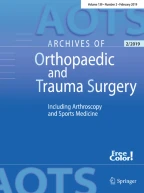Abstract
Introduction
Infected nonunion of the tibial diaphysis poses one of the most challenging scenarios. There is no clear cut guidelines for cases of infected diaphyseal nonunion with bony defects of ≤6 cm.
Materials and methods
A retrospective comparative study was conducted on 30 patients who sustained resistant infected tibial diaphyseal nonunion with bony defect of ≤6 cm. The 30 patients were the sum of two groups; group I (16 patients, mean age 33.6 years) which included all patients, who underwent two stage reconstructions, and Group II patients (14 patients, mean age 29.5 years) who were managed by application of Ilizarov ring external fixator in a single stage surgery. Union was judged both clinically and radiologically. A scoring system comprising dual functional and bony grading was employed to evaluate the final results of both groups.
Results
The results of both groups regarding the size of the resultant bony defect, the time to union, and the postoperative limb length discrepancy showed no statistically significant differences. Group II patients needed postoperative plastic reconstruction procedures significantly more than group I patients (p = 0.019). Similarly, group II patients exhibited more complications than group I patients (p = 0.003). Regarding both clinical and bony grading, the results of group I showed superiority to group II results with the only significant difference being the preservation of the preoperative range of motion of both ankle and subtalar joints (p = 0.072).
Conclusions
The use of two stage reconstruction in cases of resistant infected tibial diaphyseal nonunion gives comparable results to the Ilizarov ring external fixator in cases associated with bony defects within the confines of 6 cm with superiority in preservation of ankle and subtalar joints range of motion.
Similar content being viewed by others
References
Paley D, Catagni MA, Argnani F, Villa A, Benedetti GB, Cattaneo R (1989) Ilizarov treatment of tibial nonunions with bone loss. Clin Orthop Relat Res 241:146–165
El Haj M, Khoury A, Mosheiff R, Liebergall M, Weil YA (2013) Orthogonal double plate fixation for long bone fracture nonunion. Acta Chir Orthop Traumatol Cech 80(2):131–137
De Bastiani G, Aldegheri R, Renzi-Brivio L, Trivella G (1986) Limb lengthening by distraction of the epiphyseal plate. A comparison of two techniques in the rabbit. J Bone Jt Surg (Br) 68:545–549
Adani Roberto, Delcroix Luca, Innocenti Marco, Tarallo L, Baccarani A (2008) Free fibula flap for humerus segmental reconstruction: report on 13 cases. Chir Organ 91:21–26
Ryzewicz M, Morgan SJ, Linford E, Thwing JI, de Resende GV, Smith WR (2009) Central bone grafting for nonunion of fractures of the tibia: a retrospective series. J Bone Jt Surg Br 91(4):522–529
Austin M (1963) The Esmarch bandage and pulmonary embolism. J Bone Jt Surg (Br) 45-B:384–385
Liu T, Yu X, Zhang X, Li Z, Zeng W (2012) One-stage management of post-traumatic tibial infected nonunion using bone transport after debridement. Turk J Med Sci 42(6):1111–1120
Lee DH, Ryu KJ, Kim JW, Kang KC, Choi YR (2014) Bone marrow aspirate concentrate and platelet-rich plasma enhanced bone healing in distraction osteogenesis of the tibia. Clin Orthop Relat Res 472:3789–3797
Brunelli GA, Vigasio A, Brunelli GR (1995) Microvascular fibular grafts in skeleton reconstruction. Clin Orthop Relat Res 314:241–246
Falder S, Sinclair JS, Rogers CA, Townsend PL (2003) Long-term behavior of the free vascularized fibula following reconstruction of large bony defects. Br J Plast Surg 56:571–584
Capanna J, Campanacci R, Belot DA, Beltrami N, Manfrini G, Innocenti M, Ceruso M (2007) A new reconstructive technique for intercalary defects of long bones: the association of massive allograft with vascularized fibular autograft. Long-term results and comparison with alternative techniques. Orthop Clin N Am 38:51–60
Mahan KT, Hillstrom HJ (1998) Bone grafting in foot and ankle surgery: a review of 300 cases. J Austr Podiatr Med Assoc 88(3):109–118
Enneking KF, Eady JL, Burchardt H (1980) Autogenous cortical bone grafts in the reconstruction of segmental skeletal defects. J Bone Jt Surg (Am) 62:1039–1058
Goldberg Victor M, Akhavan Sam (2005) Biology of bone grafts in bone regeneration and repair; biology and clinical applications. Hum Press 4:57–65
Tranquilli LP, Merolli A, Perrone V, Caruso L, Giannotta L (2000) The effectiveness of the circular external fixator in the treatment of post-traumatic tibia non-union. Chir Organ Mov 85(3):235–242
Devnani AS (2001) Simple approach to the management of aseptic non-union of the shaft of long bones. Singap Med J 42(1):020–025
Laursen MB, Lass P, Christensen KS (2000) Ilizarov treatment of tibial nonunions results in 16 cases. Acta Orthop Belg 66(3):279–285
Simon JP, Stuyck J, Hoogmartens M, Fabry G (1992) Posterolateral bone grafting for nonunion of the tibia. Acta Orthop Belg 58(3):308–313
Einhorn TA (1995) Enhancement of fracture-healing: in current concepts review. J Bone Jt Surg (Am) 77-A:940
Kettunen J, Makela EA, Turunen V, Suomalainen O, Partanen K (2002) Percutaneous bone grafting in the treatment of the delayed union and non-union of tibial fractures. Injury 33:239–245
Elshafie MES (2015) Crossing screws superiority proved clinically & experimentally. In: 67th annual international congress of Egyptian Orthopaedic Association, Cairo
Author information
Authors and Affiliations
Corresponding author
Ethics declarations
Conflict of interest
The authors declare that they have no conflict of interest.
Rights and permissions
About this article
Cite this article
Sadek, A.F., Laklok, M.A., Fouly, E.H. et al. Two stage reconstruction versus bone transport in management of resistant infected tibial diaphyseal nonunion with a gap. Arch Orthop Trauma Surg 136, 1233–1241 (2016). https://doi.org/10.1007/s00402-016-2523-8
Received:
Published:
Issue Date:
DOI: https://doi.org/10.1007/s00402-016-2523-8
